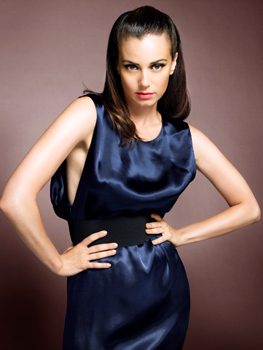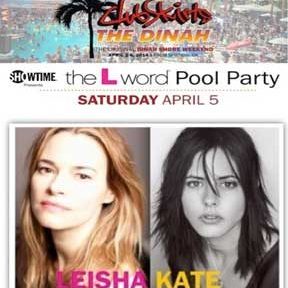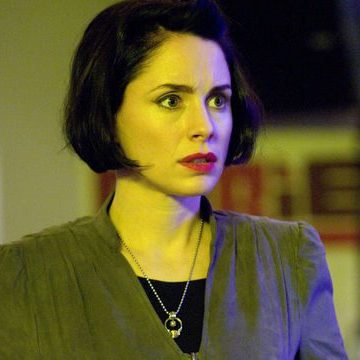
On The L Word, Mia Kirshner plays up her role as Jenny Schecter. But in real life, she’s fighting to change the world.
Mia Kirshner is best known for her L Word role as narcissistic navel-gazer Jenny Schecter. But in her downtime from the Showtime hit series, this longtime supporter of human rights organizations like Amnesty International, and has travelled with Artists for Amnesty and, over a five-year period, Kirshner actually witnessed what the lives of refugees were like firsthand. She documented her experiences and those of the people she interviewed in her debut book I Live Here. Written in collaboration with J.B. MacKinnon (Dead Man in Paradise), and Michael Simons and Paul Shoebridge (of AdBusters fame), Kirshner’s book is a highly personal and intimate look at her own émigré family and the lives of refugees in Chechnya, on the Burma-Thailand border and in Malawi. She also documents some of the 400 women thought to have been killed in North America’s worst case of femicide, and the families that survived them, in Ciudad Juárez, Mexico. The stories, woven throughout the beautiful illustrations and the sometimes-disturbing photos, are a wake-up call to the atrocities that are occurring daily, but Kirshner excels at highlighting the humanity of her subjects.
How did you get involved with Amnesty International?
When I initially began seven years ago they helped me set up the first couple of trips, but that’s basically it…I have been entirely independent of them. I just like the way when I was in high school Amnesty International was synonymous with human rights and human rights advocacy…I really wanted to give my royalties away to an organization that I respect…. Amnesty doesn’t work on the ground so I really wanted the work that we did on the book to benefit the communities themselves. This is why we set up a foundation to create creative writing programs in the places where—that we—the regions that we go to. So, Amnesty doesn’t do that kind of stuff, unfortunately.
Did writing the book change your worldview?
Oh completely. I mean, it’s hard not to when you’re travelling to places where people have really been stripped of fundamental human rights and needs, through no fault of their own. And you see they’re functioning, and so many of them are quite happy and you start, you can’t help but look at your own life and realize how much we have and how lucky we are. And I guess in many ways it made me simplify things a lot.
I was reading through the book and was struck by the part about coming back to the United States from Juarez, Mexico and how you felt like an alien.
I did feel like an alien…especially after that trip. Sort of in increments where, you know, you just get to know your life through a very—a set of different eyes…I see how lucky I am. I think I was probably taking a lot of things for granted.
Were you depressed after that?
I don’t know; I wouldn’t say depressed. I think sad. Sad, because I think you realize…that there are so many situations where you just can’t do anything to help. That sense of defeat is very disempowering. But that said, there are so many things you can do.
The idea of going out and doing humanitarian work is so interesting.
Well, you know, yeah. And I sort of—I talk about it with a sort of—in a cautious way, because I think a lot of actors have—how do I say this delicately?—I think there is something really cheesy about…an actor going out and doing this kind of work. And in a way, it has become cliché. A positive cliché, but a cliché. I just am very careful in the way in which I speak about it, because I think often it’s exploited for [their] careers…I think it’s a really positive trend for actors to go out and do this stuff. I just think that consistency is really, really important.
Why did you pick a journaling style for the book?
Because I’m not a journalist and I’m not a trained writer, so I felt like I had to—I just wanted—well, first of all, they’re not identified as my journals, there’s no byline on any of the pieces, as you’ve noticed, so it really could be anybody, you or myself. I just felt like the books were supposed to represent intimacy. So we felt—my partners and I felt like a journal sort of suggests intimacy and closeness.
Which one was the hardest for you to write?
Probably about sexual abuse and assault, I would think. You know, I’m a very private person, so I just sort of chose to write about that because I felt kind of like a fraud asking women to write about those things when I wasn’t writing about why I had a particular interest in it…because of my own experiences…with that subject….I just had something shitty happen to me when I was 18, and you know it wasn’t great. I’m not comparing myself to—my situation to—what happened to those women, but I think that I think when as a woman you have something shitty happen to you, I think that you can empathize with other women in a different way, in a certain way.
You said you weren’t a professionally trained writer. What was your process in writing this, and how did it all come together?
I did about a year of research, and I’ve always been a fan of graphic novels in general, and Joe Sacco, who did the Ingushetia comic, really was the reason why I included the comic portion of the book into each chapter. I just did a year of research figuring out where I wanted to go and what areas, at the time, weren’t being covered in the media. And then I sort of put together a mock book of how I felt the book should look. Then I wrote these passionate letters to different artists, asking them to become involved with the project. And then Mike [Simons] and Paul [Shoebridge], my partners, I wrote to them, and they met me, and I said that I thought that the book would take maybe less than a year. [Laughs] We had no idea what we were getting into, so that’s how the book was put together. Each book took about a year to put together because every single book was handmade.
What inspired you to go to Burma on the first trip?
Oh, I mean, the stuff in Burma that’s happening. I mean, if you follow it, it’s so horrific. It’s a genocide. And it’s still happening. Precisely the same things are happening as when I went there.
How did you access places like Burma, which are notorious for not letting foreigners in?
Well, I snuck into Burma, so I had no access and I—we spent most of our time in Thailand on the Burmese border in the camps. Then my guide and I decided that we would go in illegally. It was better and safer for the people we were talking to. So it was really—it was, it was that simple.
But you asked me before why I decided to do the book—was it because of Amnesty? No, I decided I wanted to do the book because I was sort of fed up with how I was living my life and sort of felt like, you know, I love to write, I’ve always written. I come from a family who is—we’re all displaced and who are refugees in a sense. And it’s an issue I’m interested in, which has sometimes changed my life.
So, what will you do after The L Word ends? Is this going to be your life now?
No, it can’t be because, unfortunately, this doesn’t pay.… So, I love to act, and it’s, it’s a pleasure for me to work on something I’m passionate about it. These books will continue. I mean, this is the first in a series.
What kind of impact do you hope this book has on people who read it?
To inspire, perhaps—I don’t like the word “inspire” because it sounds like I’m the one inspiring. [Laughs] If anything, I hope that people read it, first of all. [Laughs] I hope they go to our website and read what’s happening…And I think as well, the fact that if I can do something like this, anyone can. It was hard doing the book, and it was an extraordinary amount of work and a natural gift to do something like this. And it points to the fact that anybody can do anything they want if they try hard.
I recently heard that some activists call for investigations into what they call “gendercide” instead of genocide.
Yeah, I mean, certainly that’s why it’s women and children because they are the most vulnerable group. And, I don’t want to say a humanitarian disaster strikes. Still, when something like this happens, because they are usually the ones looking after the home, the family, they are the ones who are usually—who are going to be at risk for sexual exploitation and abuse.… Women bear the brunt of the burden of war and genocide—and all of it.
This seems like a book that everybody should read.
I think so. That was kind of why I put it together like this—or, we put it together— because I felt like I was, I don’t want it to be marginalized. I don’t want words like “activists” or “inspire” to be used because those words shut me down. After all, I’m a pretty cynical person—and it feels like you’re being talked down to…so I tried to use a language which I felt would appeal [to people] who are as cynical as I am.… I mean, I feel like…I’m up on a box, but these aren’t women’s issues…and they shouldn’t be in gender studies classes. That’s the last thing it should be in.
You mentioned your family were refugees. Can you elaborate more on that?
There’s the Holocaust background on my father’s side; they’re survivors of that war, and on my mother’s side too. So, we sort of grew up not knowing what happened to the family…really haunting all of us, and I’m sure that’s why my father became a journalist…and my mother teaches refugees. She was an ESL teacher for many years. And my mother herself had immigrated from Israel to Canada…and always felt like a foreigner in Canada, and not quite sure where her home was—whether it was with her family or in Israel. So, all of this stuff was thematic growing up.
Did that help you sympathize?
I haven’t been through that, so…it’s heartbreaking…but…it was familiar, those stories. Does that make any sense?
Yeah, it does.
Yeah, I’m being careful with the words I use, you know, because I know how lucky I am.
How does it feel to be playing a character like Jenny?
I agree with what’s said about the character for the most part. But again…it’s my job. So, I mean, it’s a fun character.
What’s something that gets you and the other cast members giggling?
We’re always playing pranks on each other. For example, last year, Kate [Moennig] and Leisha [Hailey] stuck fake silicone breasts on the headlights of my SmartCar, which I drove around a couple of weeks because I didn’t notice. And Kate is driving around with the same thing in her car. [Laughs]
Does she know it?
She has no idea.
Was that your revenge?
Yes. But I know she’ll get me back. I don’t know, the girls, they’re hilarious, really fantastic, funny people.


